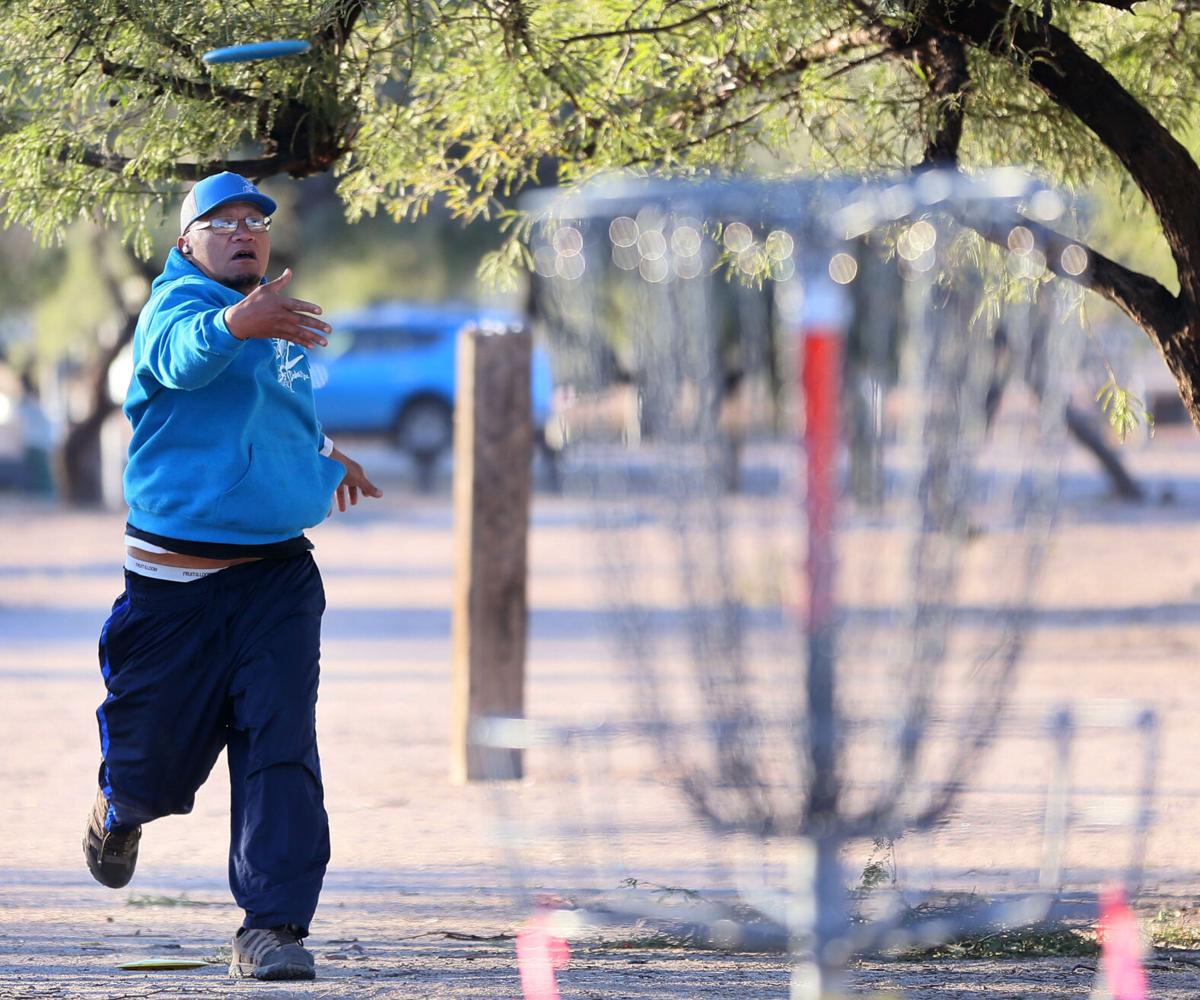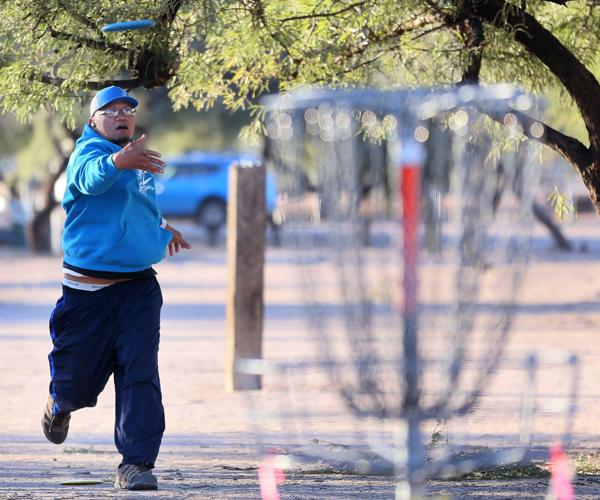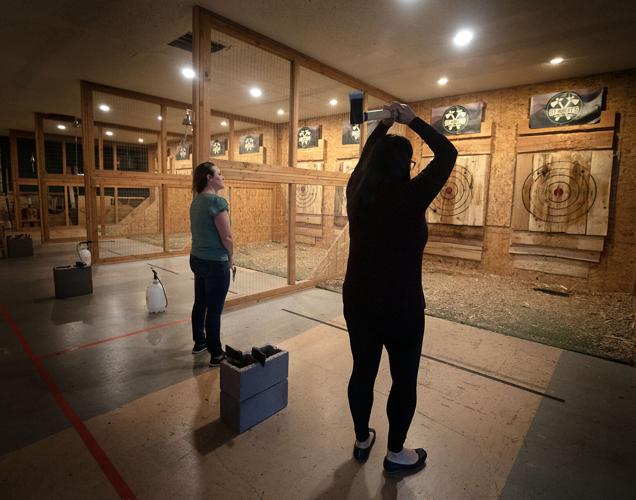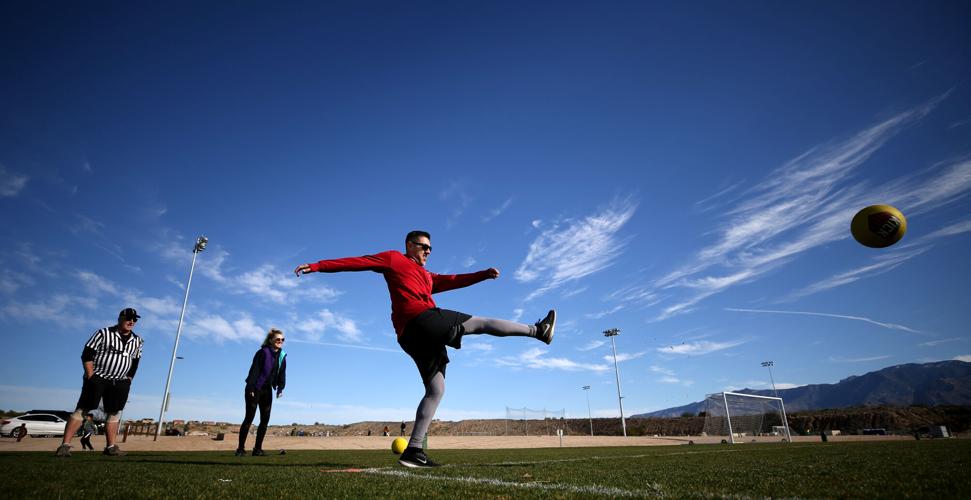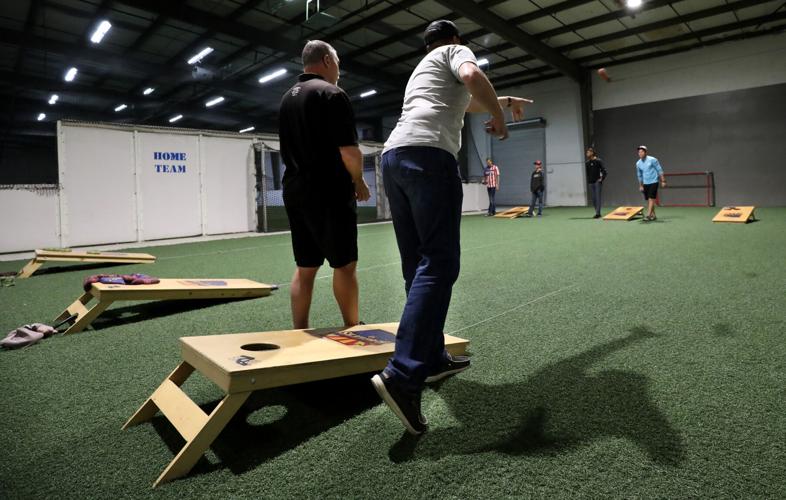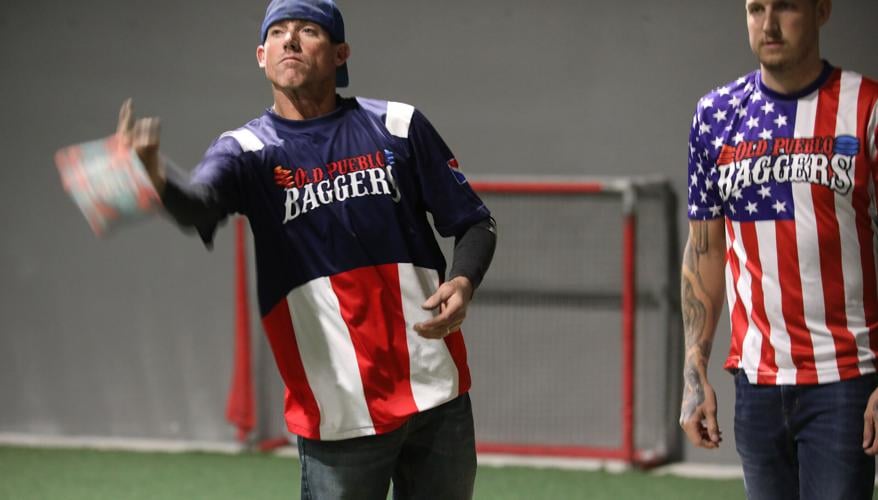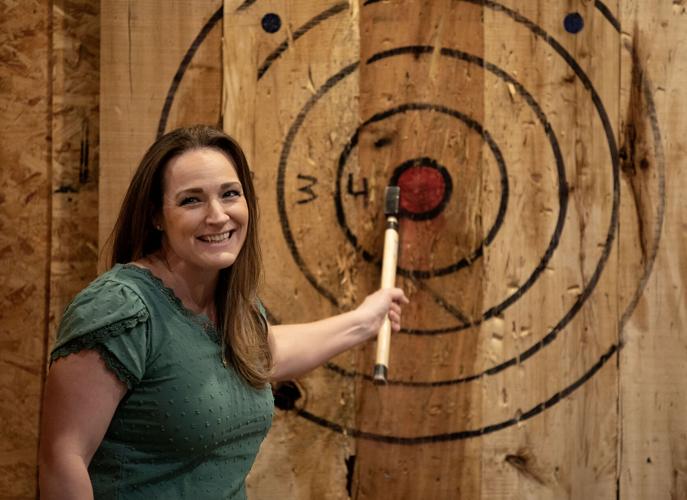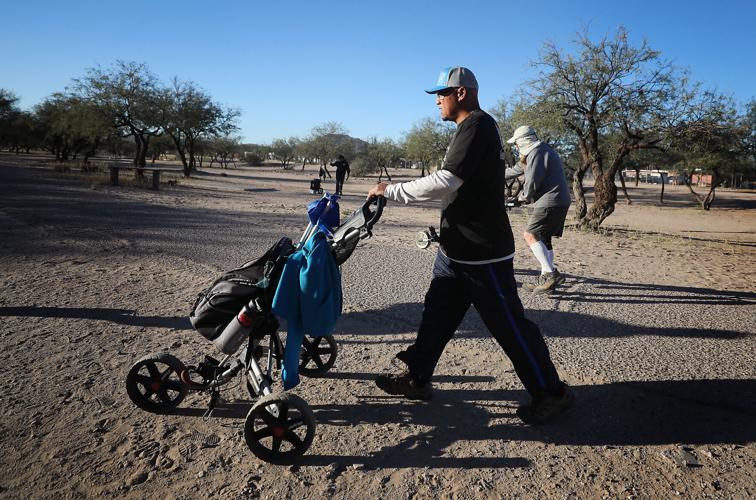Sure, you can sink 3-pointers at the buzzer and run footballs through a sea of gridiron warriors the size of Buicks to score the game-winning touchdown.
But how are you at throwing axes, tossing bean bags or launching a kickball barreling at you at high speeds using only your foot?
Sports come in all shapes and sizes. And while the world enjoys its gold standard activities, its soccer, football, baseball and the like, you don’t need to be Cristiano Ronaldo or Kyler Murray to put your competitive spirit into action.
Tucson has a long list of social sports, outside of the mainstream, that are fun to play and are open to just about anyone willing to participate.
Disc golf
Disc golf, a sport where players toss flying discs at long-distance targets, like golf without the clubs or balls, is a prime example.
People are also reading…
Tucson has six playable disc golf courses, eight disc golf leagues, multiple courses designed by a disc golf hall of famer, and a 16-year running tournament on Mount Lemmon. After the COVID-19 pandemic, Tucson is one of the many metropolitan areas experiencing an increase in interest.
Tucson local, Jeffery “Thumber” Homburg, the disc golf hall of famer, is a founding father of the sport and practically created the Tucson disc golf environment. Homberg, 65, said that over the last couple years the sport’s steady growth has rocketed into something unprecedented.

Tsu Selusi walks with his cart to the next hole during a weekly game of disc golf at the Santa Cruz River Park disc golf course.
Homburg attributed the new found popularity to the COVID-19 pandemic.
“It had been growing 10 to 15%, but over the pandemic, I would say, we grew four times as fast as what we projected,” he said.
When Homburg came to Tucson from Oklahoma in the late 1970s, he had to fundraise and campaign for course development without the support of the city. Homburg said the disc golf community installed the Sam Lena course, 3400 S. Country Club Road, and Groves Park course, 7400 E. Juniper Dr., totally independent of the parks department.
“We paid for all the equipment and we installed it,” Homburg said. “The city didn’t do it. I worked out a deal with the manufacturers to get the baskets at a very good price … same ones that are out there now.”
Homburg said that the most beneficial move Tucson could make for the growing community would be to institute “permanent hybrid disc golf and ball golf courses.”
Tucson is currently ranked as the third best disc golf destination in Arizona, behind Mesa in second place and Flagstaff in first.
For more information on local leagues, tournaments and courses, search for “Tucson” on the website, discgolfscene.com.

Lauren Scherzinger, right, competes against Jenn DeShazo during a game of ax throwing at St. Hubert’s Hatchet House, 908 W. Prince Road.
Ax throwing
Brett Joyce has one simple piece of advice for folks who have never thrown an ax before: Try not to throw it as hard as you can.
“People think it is a power activity,” said Joyce, who opened St. Hubert’s Hatchet House, a recreational ax-throwing facility on Tucson’s west side, with his brother, John Joyce, in 2018. “They think lumberjacks. It is more of a finesse thing than anything else.”
Brett Joyce first learned about indoor ax throwing while going to school in Vermont.
“Vermont is right next to Canada,” he said. “Indoor ax throwing is a Canadian import of sorts.”
When the Joyces opened their spot in Tucson, named for the patron saint of loggers and hunters, with 10 targets spread across 3,500 square feet of space at 908 W. Prince Road, there were no other facilities in town.

Jenn DeShazo is all smiles after hitting the bullseye during a game at St. Hubert's Hatchet House, 908 W. Prince Road.
Several have come and gone since. Another ax throwing spot, Splitting Timber (facebook.com/SplittingTimberTucson), is still operating at the Tucson Premium Outlets mall in Marana.
Brett Joyce said their business got off to a slow start, but has picked up steam. He estimates that the number of people who have tried their hand at ax throwing at St. Hubert’s since they’ve opened is in the tens of thousands.
“It has become a more regular option,” he said. “You can go to Top Golf with your friends, bowling or go throw axes.”
The rules are fairly simple. Two players square off, throwing axes at two different targets that are not unlike oversized dart boards. A bullseye gets you six points. Points drop the further you get from the center. A kill shot, located above the target, to the top left and the top right, are worth eight.
During recreational play, axes are provided by St. Hubert’s.
“They are professional grade,” Brett Joyce said. “Some are purchased through the World Axe Throwing League. Some are American made. Some are Swedish made.”
League players will often bring their own, custom-made axes.
“They do all sorts of crazy stuff,” Joyce said. “They will rehandle them to make fancy, rare wood handles. They get very into personalizing their hobby.”
Joyce said St. Hubert’s is an affiliate of the World Axe Throwing League, so league players that participate in tournaments have the opportunity to move on to regional play if they are good enough.
Leagues are open to players of all skill levels who come from all walks of life, Joyce said.
“We’ve had people involved in construction, nursing, retail sales, cooks, musicians,” Joyce said. “It is a nice way to get people together.”
Ax throwing not your thing? St. Hubert’s also offers knife and throwing star sessions. It also allows drinking, with a two-beer per person, BYOB option.
Joyce said St. Hubert’s is looking at having a full-service beer and wine bar built at the facility in 2023.
Visit sthubertshatchethouse.com for more information.

Jose Campa drills a shot to the outfield at a kickball tournament in 2019. Tucson has several kickball leagues, including one run by Clubwaka.
Kickball
Kickball rules Joaquin Murrieta Park, 1400 N. Silverbell Road, each Thursday night as hundreds of players spread across 24 teams go head-to-head on two fields as part of the Clubwaka Tucson social sports league.
Each game is 55 minutes or 7 innings, whichever comes first, and all skill levels are welcome, said Matt Maynard, the league’s director.
In adult kickball, even the most seasoned players in other sports might face challenges, Maynard said.
“I am a born and bred soccer player,” he said. “When soccer players come out, they think they are going to hammer a kickball. But there is only a pound-and a half of air in it. If you don’t hit it perfect, you are only going to kick it 20 feet in the air.”
The ultimate name of the game is having fun, Maynard said. Social challenges, like wearing your favorite superhero costume, are given to players each week. Teams have silly, sometimes naughty names, things like Waka Shame (playing off the league name) and Hut up or Shut-up, an homage to the league’s primary sponsor, The Hut on North Fourth Avenue.
Clubwaka is a national brand that organizes adult and bar sports in cities across the country. It got its start in Washington, D.C., in the late 1990s and launched in Tucson in 2009.
In addition to kickball, Clubwaka hosts bowling and volleyball leagues, but its kickball league is its most popular sport, by far, Maynard said.
Maynard said people can get competitive, but “the league at its core is a social league. The majority of our players don’t fall into the truly competitive bracket.”
Clubwaka runs three kickball leagues throughout the year. For more information, visit clubwaka.com/leagues/tucson.

Old Pueblo Baggers play cornhole at Iron John’s Brewing Company, 555 E. 18th Street.
Cornhole
Cornhole, the once niche activity that involves tossing bean bags with laser-like precision through holes in the boards of your competitors, has seen a surge in the Old Pueblo.
Finding a serious community of dedicated cornhole enthusiasts in Tucson was a difficult feat five years ago, said Eli Musitano, director of the local cornhole group, the Old Pueblo Baggers.
“We started out because there was no cornhole in Tucson … We loved the sport and knew that people would want to play it if they had the option to,” Musitano said.
The Old Pueblo Baggers have been “letting the bags fly” as a local cornhole group for almost four years now and Musitano says that the Baggers’ positive effect on the community has been “tremendous.”

Joe Eccles, left, of Old Pueblo Baggers, tosses during cornhole at Iron John's Brewing Company, 555 E. 18th Street.
Multiple cornhole groups engage in cornhole nights around town, cornhole fundraisers, extracurricular cornhole in schools, and there are even permanent concrete cornhole boards installed at city parks, Musitano said.
The accessibility of cornhole was an element of the sport that Musitano was excited about when he first started because it invited such a diverse range of players.
“As long as your arm works to throw that bag, you can play cornhole,” he said.
Musitano and the Old Pueblo Baggers are more of a collective than a strict team, with a roster of about 50-100 local players.
The group has grown so much that the American Cornhole League has recognized Frank Musitano, Eli’s husband of the last 16 years, as a regional director.
As director, Frank Musitano and the rest of the Old Pueblo Baggers help set up and organize cornhole tournaments and events all over Southern Arizona.
The Old Pueblo Baggers’ weekly Thursday tournaments at Iron John’s Brewery, 555 E. 18th St., have been a welcome gathering for all skill levels of Tucson cornholers.
“When we throw our weekly tournaments we say, ‘Come early and we’ll show you how to throw a bag. We’ll show you anything you want to help you get comfortable should you want to play in our weekly tournaments and our bigger tournaments,’” Eli Musitano said.
Eli Musitano is optimistic about the future of cornhole in Tucson and hopes that all members of Tucson’s cornhole community lift each other to be the best they can be.
“Grow together, throw together,” Eli Musitano said.
Follow the Old Pueblo Baggers at facebook.com/oldpueblobaggers.
From Kan Jam to cornhole, there are many outdoor games you can play with your friends and family. Check out our recommendations to best enjoy the summertime.



